Interviews 2001 (Part Two)
Loveline
Transcript of radio appearance on Loveline with Dr Drew & Adam Carolla, 11 July 2001
[Re Tortured Souls] "I promised what I would do if I was going to go into the idea of
figurines I would make the most intense figurines I could make... I've
written a story, a six-part story, so each character gets a story to
go with them. And if you collect all six you get this huge Clive Barker
piece of fiction...
"You know what is weird? They're like candies, they're like these
strange candies; they're beautiful things. I mean the craftmanship
that goes into them is something else."
Toying With Torture: Clive Barker Wants To Play With You
By Luke Y. Thompson, New Times Los Angeles, 12 - 18 July 2001 (full text online at www.newtimesla.com)
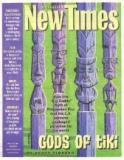
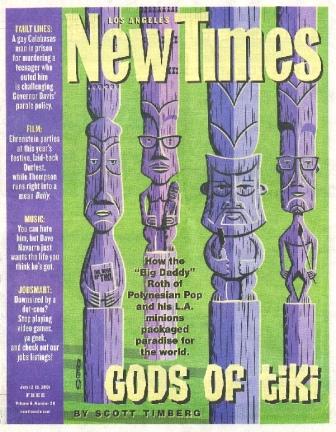
New Times Los Angeles, 12 - 18 July 2001
"[I want to] leave [people] with an impression, leave them with
something they couldn't get anywhere else. I like messing with
people's minds. Intensity messes with people's minds.
"[Tortured Souls is] going to be a test. My fan base and Todd's fan
base overlap, [but] the people who like the big fancy novels, I think
we're going to have to educate them a little bit.
"I think this is like the first time Hieronymous Bosch might have
designed a toy, and I think it's neat, in its weird sort of twisted
way. They're beautiful things, I mean, they're really elaborate,
baroque sort of creations."
Clive's Busy, Busy, Busy, Busy Year
By Smilin' Jack Ruby, 13th Street, 12 July 2001 (note - part one of a two-part interview, full text online at www.13thstreet.com)
"I'm just reading today the reviews of A.I. and I haven't seen the movie yet, but everybody's saying it's Close Encounters or it's Pinocchio, it's this or it's that and nobody's saying, 'It's a new thing.' I want to make new things. I don't want to be stuck at the age of 48 echoing myself. I want to, if possible, and I realize that there are some people who are going to say, 'but these things look like the things from Hellraiser.' There's a certain element of truth to that. These creatures [Tortured Souls] have got the fetishistic things that are going on in Hellraiser, but when you read the stories, you'll see how radically different their origins are and how radically different their stories are. In fact, the way I looked at the thirteen and a half, fourteen thousand words that all these stories add up to and I thought, this is interesting. Writing for toys has actually made me do something different in literary terms. That's kind of interesting. If a new medium - plastic - makes me do something different with words then more power to it. I want to continue to find new places for my imagination to play."
Clive Barker
By Smilin' Jack Ruby, 13th Street, 13 July 2001 (note - part two of a two-part interview, full text online at www.13thstreet.com)
"My dream is to get something like Hammer Pictures going really, where I have a chance to make smaller-priced pictures that are creative because there aren't too many cooks in the mix. Maybe I get to get a little studio going. You know, what Charlie Band [Full Moon] did. I was not a great admirer of the films that resulted, because I think Charlie Band did it at too low a level, but there are some really wonderful movies that came out of Hammer. There's some really great films that came out of Corman's outfit. You know, one of the reasons those movies why those movies are great, one of the reasons why so much that Todd [McFarlane] does is great, is because there's a singularity of vision there. There aren't a whole group of people, I'm thinking particularly of the kind of committee-feeling you get in a lot of studios, who are offering it down to its lowest common denominator."
Meltdown in LA Over Tortured Souls Signing
By [ ], online news at www.spawn.com, 20 July 2001
"It was an unbelievable event. I don't think it could have gone better as an introduction to the world for the toys. The response was amazing, the store was cleaned out! [The fans] were just loving the detail, the finish and the perversity of the figures. I just don't think toys get any better than this."
Unlikely Couple Weaving Musical Magic Into Barker's Art
By Christa Titus, Billboard, 21 July 2001
[Re Korn DVD project]: "I was practically wetting myself.
What got me was the depth of conviction between the music and the image [Blue Vision]. I
don't like to use the word 'soundtrack' because I think that's a reduction
in terms, but on one level, that's what they're doing. I think they're also
providing a kind of explanation for the nature of the paintings."
"Here's two extremely smart, creative folks who want to do
something which is completely off the wall, something which doesn't have a
precedent. I would be an idiot not to want to do that. When they came to
visit, I was like, 'Let's do it!' There's nothing about this that doesn't
suit my sensibility, which is doing it without censorship from anybody.
We're making something original and sharp."
Clive Barker And Rude Guerilla Theater Co. - A Mutual Admiration Society
By Eric Marchese, online at www.calactors.com, July 2001
"[Los Angeles] is not a very comforting city. I mean, I live up in the hills away from things. Painting, I can do anywhere. Writing, I can do anywhere. I like being involved in movies, I get great pleasure out of it. When I've decided I've done enough, it won't be a great displeasure for me to say that I'm leaving the city to do more writing and painting."
Sympathy For The Devil
By Michelle Olley, Attitude, No 88, August 2001
"The house that I'm in is two houses down from one of Marion Davies'
orchid houses, which was then moved in its entirety from its present
location and then plonked down in the Canyon where I presently live.
I'm looking across Coldheart Canyon right now. It has a big house on
top of it which is locked up. I wanted to explore the canyon as well.
That's when Tammy's story started to appear. She's the one who takes
the epic journey, she's the one who goes from zero to hero as it were.
She is really not the woman that she was when this story began and you
can't do that in a short narrative. Part of the fun of novel writing
is being able to take a long journey with people and to actually sit
there with my readers and say, OK, I'm now going to tell you a long,
complicated story in which these people are going to end up in
completely different places from where they started and it's going to
be practically impossible to guess how they are going to end up."
Clive's Hellraising Days Are Over
By Scott Faulkner, Liverpool Echo, 4 August 2001
"I'm a writer who is interested in telling people stories of all kinds and moving people with my words. I have no control over the Hellraiser film franchise but I do control the literary life of the character, and so the book I am delivering to my publishers next year, Scarlet Gospels, will contain a novella in which Pinhead dies. How he dies and who he takes with him is another story, but it's time to bring him in.
"The books I have written recently have been large-scale and all-encompassing. I believe it is rather small-minded only to use the dark parts of one's imagination. Weaveworld was a big, fantastical book. And if I had to categorise Galilee, I would describe it as a broad, sweeping romance...
"It changes everything when your dad dies. We didn't always see eye to eye and I took a route with my life that was very hard for him to understand. As an artist you have to have a lot of faith and right through my 20s I didn't have a job and it drove my mum and dad crazy. Mums and dads want you to be a teacher or a doctor but I was determined I would write, paint and be a film-maker and always had faith I could do it. When I started to make some money my mum and dad were incredibly proud of me."
Removing The Mask Of Terror
By Stephen McGinty, The Scotsman, 11 August 2001
"I don't think it would be very easy to work out from the book [Coldheart Canyon] whether I love or hate Hollywood. That's because I
am very ambiguous about it. There are things I love about the city and there are things I despise about it.
"I think it is a pretty outrageous book, but you know Hollywood is an outrageous place, and there were a few names of stars that I
had to take out. But I wanted to leave enough clues so anybody who really wanted to look at the book with an eye to who is who
would be able to find out. Interestingly, my publicist, who has worked in Hollywood for a very long time... recognised everybody
instantly. So it is fun."
Boogeymen Panel
Transcript of Boogeyman Panel from Fangoria's Weekend Of Horrors, Pasadena, 11 August 2001
"I think it does start with the actor. I think it is true that I've
been blessed by three or four really superb actors. The guy that played
Nix in 'Lord of Illusions' is wonderful. Tony does an amazing job. They
give a kind of weight. Look, we're asking them to communicate something
that is basically very ludicrous or weird or outlandish. We're asking
them to communicate to the audience something that a regular, sane
person would say, jeez, I'm not gonna buy into that. The actor is on
the first level. He's the first person that makes it real for the
audience.
"These guys in the middle [Tony Todd, Robert Englund and Gunnar Hansen]
are making the unreal real. We can put as many words on the page, as
Pete [Atkins] says, but if the actors can't do it, it doesn't matter.
I give you all those terrible movies where the actors don't do it. We
all know them, Fango reviews them all the time, in which maybe there is
some nice writing, often there are some great FX, but God, the acting...
I think we've also got to say that the special FX guys have given us
many of the great monsters. We haven't talked about those guys. Those
guys are the creators of the visions that Robert was talking about."
Clive Barker Talks Boogeymen
By Smilin' Jack Ruby, transcript of an interview at Fangoria's Weekend Of Horrors, Pasadena, 11 August 2001 (note - footage online at www.13thstreet.com)
"One of the services that this disc provides
is a sort of a guide to what happened 20 years ago or 15 years ago in
horror movies - for people who were only a gleam in their fathers' eye
at the time - then great! I think the best of them stand up very well
against what is currently out there passing for horror movies...
"The fact that two monsters, two of my monsters do find their way onto
the roster is great. And they're very different kinds of monsters;
Hellraiser is a movie which is a very cold movie in lots of regards,
it doesn't have much feeling, you don't feel a great deal for the
Cenobites. I think you end up feeling a great deal for the Candyman. I
think he's a monster you feel a certain bittersweet sorrow for..."

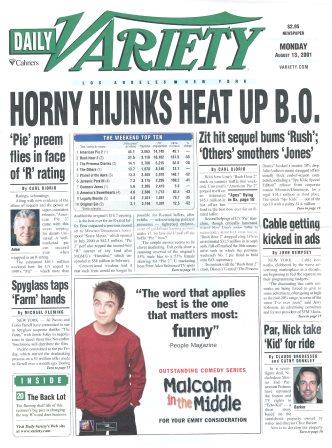
Daily Variety, 13 August 2001
Par, Nick Take 'Kid' For Ride
By Claude Brodesser and Cathy Dunkley, Daily Variety, 13 August 2001
"In Ecto-Kid, the Other Side is here and now. This other world is our
world - but not. It's everywhere, but nowhere.
"I hope to create a franchisable world for Nickelodeon, but also one of
great, transcendent beauty; one that reconfigures people's expectations
of what ghosts are, of what comes after death."
Fuck The Canon
By Dennis Cooper,
(i) LA Weekly, Literary Supplement, 31 August - 6 September 2001
(ii) as 'A Conversation With Clive Barker' online at www.entertainmentindustryreport.com
"Now, I may be 48, but I can still be a fan boy about that [Hollywood]
kind of stuff. I can still be totally fascinated by how this group of
demigods operates on our collective consciousness, but also on our
individual consciousnesses, and how we secretly try to match up to
them. And what I wanted Coldheart Canyon to do, in part, was address
what a crock of shit that was. By transferring our appetite for the
transcendental to those tatty remnants from a freak show - which is
what many of the people we attach our attention to are - we do two
terrible things. We advance people who are just regular human beings
and set them up for falls, and we take that sacred appetite and put it
where it can be of absolutely no use whatsoever. One of the things I'm
interested in all through my books is what we do with our appetite for
God in a world that seems to have taken Him, or It, away. Over and
over and over again, my characters attach themselves to unworthy
divinities.
"To me, apart from Zen and certain strains of Buddhism, religion is
all about rigour. It's about there being only one way. But the idea
that we should be able to play with the relationship between what we
worship and what we think worthy of worship is something I want to get
at. You know, that the movie stars we worship are just fuckups like us.
Obviously, sex lies underneath our appetites for all these people. We
think what it would be like to go to bed with X or Y, yet mainstream
American cinema remains remarkably sexless."
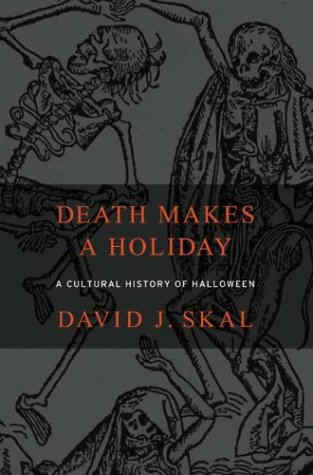
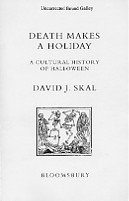
Ideal Clive Barker Costume
By David J. Skal, Death Makes A Holiday, 2002 (note - interview took place September 2001)
"If [the gay community] can somehow play with death, that empowers us, and gives us a way to say we're not going to give in. Gay men and women have been incredibly smart over the years in using humor to take the sting out of death... [But] I don't think anyone's really intellectualising when they're dressing up and smoking a joint and putting on a mask."
My Bizarre Life : Clive Barker
By Billy Chainsaw, Bizarre, No 50, September 2001
"The door that occurs so often in my work is a door inside my head. It leads from the conscious world into the unconscious, from the real and the quantifiable to the inexpressibly vast and majestic. Once through that door one sets out on a journey. Sometimes it can prove to be a cul-de-sac. One is led back into the mundane, usually because there is a lack of courage at that particular time to journey very far from the known. The fear is always that one will venture so far that one will lose contact with the things that one loves - home, friends, partners - and there won't be a possibility of return. This is the fear of madness, of the sealed world where the light of love and reason cannot come. But other journeys take years. A novel like Imajica is one such journey, and can change one's view of life completely."
Clive Barker Interview
By Tony Almond, Samedaybooks.co.uk, [October] 2001 (note - available online at www.samedaybooks.co.uk)
"I used to say that there was some things I would not write about. I
used to mention Auschwitz, for instance, as one such taboo subject.
But now I no longer believe even in these few limitations. For me, now
nothing is taboo. In my plans for future work there are projects which
will make much that I have done to date seem mild!
"You ask where my inspiration comes from. I believe it's rooted in a
passion to reach beyond the petty limitations set up for us by people
who erroneously believe they know better than we do: about art, about
ethics. Our power to comprehend ourselves often is fueled by subjects
which the so called guardians of morality and good taste would consider
inappropriate."
The Barkerian Way
By Jeffrey Stringer, Inside Borders, October 2001 (note - available online at www.bordersstores.com)
"I write as a documentarian, as somebody who is simply watching these
events and trying to set them down in the most honest way that I can.
These images are coming into my mind's eye and I'm seeing them with
incredible force. I don't feel as if I have to judge. It's also the
case, of course that we are, as a species, fascinated by what the most
monstrous in our community of human beings are capable of. In my life
I've known very, very bad people. I've also known some extraordinarily
good people. And, you know, if I sat you down with a very bad guy and
a very good guy for a conversation over a whiskey, I'm not convinced
you would be able to guess which is which. I think of Pol Pot, who
died of old age, not really ever admitting that he had been responsible
for the murder of millions of his fellow Cambodians. People who met
him towards the end of his life were presented with the rather
confounding image of a weary but polite old gentleman. Villainy is an
incredibly complicated business, and it is by no means the simplest
thing to describe an evil character in a book. A lot of the time I
want to make the villainous characters rather seductive, as opposed to
making the villain a character that kicks dogs and slaps women, which
is just easy. I spent some time researching in a prison, and I was
able to spend a lot of time with murderers, who were some of the most
charming people I've met. And then I've met people who've written
books I loved, who've painted pictures I loved, who I couldn't bear to
be in the company of for more than two minutes."
Clive Barker Does Hollywood
By John Mark Eberhart, Kansas City Star, [October] 2001 (note - reprinted online (i) www.gaywired.com, (ii) www.lesbianation.com as 'Clive Has His Fun with Tinseltown')
"I loved this town when I first came here. I would go into
the studios; I would have a meeting... drive through those
gates, and I would feel blessed. And now...I know the intellectual
status of the people who dwell in the offices beyond those gates, and
I've had so many meetings with people who just drive me crazy with
their stupidity, crazy.
"I'll give you an example. An executive (once said to me), 'Gee, it
must have been really difficult living under the Nazis.' And I said,
'What do you mean? How old do you think I am?' And he said, 'When were
you born?' I said '52, and he said, 'The Nazis were there in the '60s,
right?' And I said, 'No, the Nazis were not there in the '60s! Good
God, where's your history?' He was a young guy. He thought they were
in England and he thought they were in England in my lifetime."
The Relaunch Of Clive Barker
By Jeff Zaleski,
Publishers Weekly, 1 October 2001 (note - available online at www.publishersweekly.com) (note: several short
quotes extracted in Barker: La Consecration...Enfin? by Christophe Corthouts in French in Science-Fiction Magazine, No 31, February 2003).
"I don't believe that I am the only creative part in the system. True
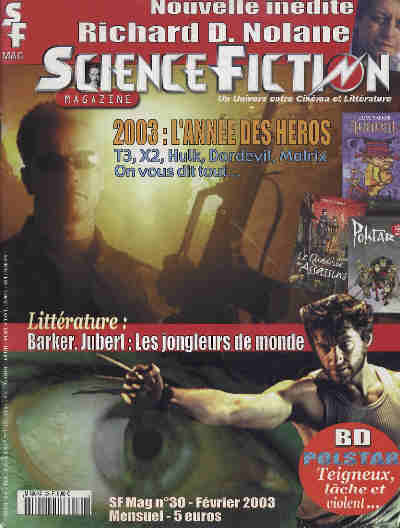
creativity cannot be about ego, cannot be about, 'I did this.' There
is a wonderful print by Goya that's signed, 'I saw this.' That's
different than 'I created this.' I don't think I create a lot, I think
I witness a lot. I witness a lot that is being put into my mind's eye
by...I don't know what.
"I literally just throw the pages down. Sometimes it feels as though I
am not in existence. There are large passages in every book that I
cannot recall writing. Last night I came to bed about nine o'clock and
wrote. I wrote 20 pages and it was bliss. I had one of my dogs at my
feet, I had my naked husband beside me. What can be more perfect? I
was writing, and I was in the zone. This great body of myth and story
and folklore and fairytale is the sea of our imaginations, into which
we plunge regularly and emerge with some new thing to carry into our
waking lives. It is my job to confuse anybody who figures out that
they have got me cornered and packaged. 'Oh Barker, he is the guy who....'
No, I am never 'the guy.' I am just an imaginer. I think the heart of
what I do lies in the shamanistic instinct to be a walker between
worlds."
Imagining New Worlds
By Robert Starner, Lambda Book Report, Vol.10, Issue 3, October 2001
"Disney will create a theme park and at least one movie. Hopefully there
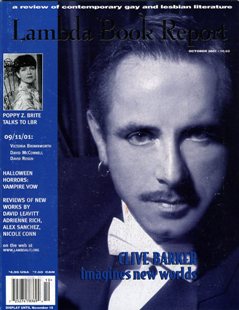 will be more. The first four books are just a starting place...
will be more. The first four books are just a starting place...
"There are so many reasons why
Disney could have been nervous and there was none stated, absolutely. And I
think there's a sense in which Disney hopes for a certain edge from this.
Rather than the very sweet work, this is going to have a little edge. And
the truth is that children's fiction is increasingly going [in that
direction]. Disney's never been afraid to scare anyone. You know there's
always been a dark element to what Disney's done. You go on many of the
rides at Disney World, pretty scary things. I remember going on the Haunted
Mansion ride for the first time and going past the landscape of tombs where
the doors are falling outwards, the bodies are seen on the other side, the
hands are reaching out towards you, I mean that's pretty strong stuff."
Politically Incorrect
By Bill Maher, 2 October 2001
"Well, it seems to me that, you know, one of the things that is
pointed at America constantly is that we have a very commercial
culture, that we are constantly preoccupied with selling. And I think
this is the wrong time to be preoccupied with the bottom line. We need
to be preoccupied, I agree, with mourning, with building, with dialogue,
with fairness. All of those good things, with not being preoccupied
with the minutia, but dealing with the broad strokes of what's going
on here...
"I think there is something disgusting about the idea of just
concerning yourself with the bottom line. And I think we can - just
one thing? And I think we can vote with our [feet] here, and we can
decide not to purchase the things that are being advertised that way.
And we should."
Stars In Hell
By Michael Giltz, The New York Post, 14 October 2001 (note: full text online at www.michaelgiltz.com)
"The lawyers weren't too happy with me. You're familiar with Kenneth Anger's book [Hollywood Babylon]. I don't think I'm saying
anything - putting aside Lana Turner, of course - that hasn't been said elsewhere. The fun was putting in people who are still
alive, which is a lot trickier.
"Those were pretty high times in Hollywood, It wasn't sex, drugs and rock n roll; but it was sex, drugs and jazz. In one sense,
the characters are far more extreme than the people I know in this town. But in another sense there are things that go on
in this town that if you wrote them down, people would say, 'Forget it; it's not true.' This is a town of extreme behaviour. Who
would have thought that Robert Downey Jr. would appear on our TV screens at the same time as being let out of jail?"
Movie Monster Mash For AMC
By Gina McIntyre, Hollywood Reporter, Volume 370 Issue 27, 19 October 2001
"There's a whole bunch of information in there, which a regular viewer of a movie might not otherwise get. I think we're going to have a few people come away from these movies saying, 'I know a little more than I did.' These are interesting pictures, and a couple of them are American masterpieces."
MonsterFest Is A Howl
By Kate O'Hare, Chicago Tribune, 21 October 2001
"Tim [Burton] and I have a bunch of stuff in common, I think we have
a vision in common - a dark, but I hope, in the end, life- affirming
thing.
"When people come to the end of my new novel, Coldheart Canyon, they're
going to feel like it was a life-affirming ride. That's what I feel the
scary stuff does, it ends up making you feel better about your own life. When I think
about what movies do, one of the things they do very well is make you feel
good. Movies make you feel good more often than books do. I don't think
books are necessarily a feel-good medium. Books are something that make you feel very deeply, but I'm more likely to
come out of a movie with a little spring in my step, even a horror movie.
Horror movies make me feel really good."
Oh, The Horror! Oh, Boy!
By Andy Seiler,
USA Today, 25 October 2001
"I've turned images that are distressing to me into the stuff of fiction. It has immensely helped me make sense of why I'm afraid. We're all afraid. Fear is part of our tradition."
New Respect For Old Genre
By Susan King,
Los Angeles Times, 26 October 2001
"They [AMC for Monsterfest] came to me with a list of movies and I said if you are actually going to show
these movies, then I'll do it. It was a very cool list. What I liked about it was that
there were some obvious titles and some less obvious titles. It felt like a fun thing to do.
"Very often when people who front [these movie festivals] have their tongues firmly in their cheeks. I
don't like that. I told the AMC people the only way I'll really be comfortable doing this is if the
introductions are respectful and informative. Obviously it can't be a college lecture but it can, at least,
be that we can talk to some degree about the movies. They mean something to the culture at large."
Thriller
By John Polly, Next Magazine, Vol 9 Isue 16, 26 October 2001
"Dark things are always true, and they're the stories that don't get told as much. One of the ways that you deal with dark stuff is to be conversant with it, is not to be afraid of it. What is scary is stuff that is unknown."
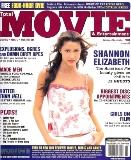
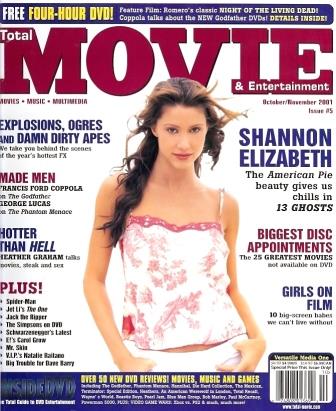
Total Movie & Entertainment, No 5, October/November 2001
Sex And The Single Monster
By Steve Palopoli,
Total Movie & Entertainment, No 5, October/November 2001
"A boogeyman has to be relentless in his pursuit of the object of his haunting - that's the first thing, relentlessness. This guy has got to keep coming and coming. It's basically an unstoppable force. There may be a few exceptions to this, but I think you basically look at the creatures on this compilation and what you have is the locomotive in human form, something which has such force, such power, that you're reminded of that feeling of helplessness you have in nightmares sometimes when something is in pursuit of you and you know that wherever you go, however you try to hide, it will find you."
Canyon Country
By Anthony C. Ferrante,
Cinescape presents the A - Z Guide To Halloween Horror, November 2001
"A lot of characters in this book [Coldheart Canyon] are angry about
the way Hollwood has treated them. I wanted to look at how angry I do
feel about the way Hollwood has treated me. I'm not that angry, but I
can get there if I try. I can cook up some real rage if I want to,
like watching Bill Condon going around trying to sell Gods and Monsters
to studios for 18 months or turning a script which I loved in to New
Line and not getting an answer for three months. There are times I've
been really pissed off, and I wanted to speak out of that place and
make the book more truthful as a consequence."
Barker On Barker
By Arnold T. Blumberg with Anthony C. Ferrante,
Cinescape presents the A - Z Guide To Halloween Horror, November 2001
"I have to do more stories like [The Thief Of Always]. The book gives people an immense amount of pleasure. I have a couple of ideas with that side up my sleeve. After my next two books, I will go and make some more fables for children."
Valley Variety
By Margie Barron, The Tolucan Times, 14 November 2001
"I'm a buff where early Hollywood is concerned. I think movies
confer a type of immortality...
"The imagination at its most uninhibited can be pretty frightening.
The one thing I aim for is to explore and expose the furthest edges of the human imagination."
Clive Barker
By Tasha Robinson, The Onion, 14 November 2001 (Note: online at www.theonionavclub.com)
"I'm very conflicted about modern Hollywood. I've had great times here,
and I've had terrible times here. I've met some wonderful people, and
I've met some dreadful people. It is a shark-infested pool, but there
are also some really nice people here, too. Most of them are missing a
limb, but that's what happens when you swim with sharks. Even though
the book is a fantasy, I wanted to provide the reader with the feeling
of what it's like to be here, to be dealing with the egos, to be
dealing with... Some of this stuff is almost in passing. For instance,
when Todd is at home in the Canyon, and he can't go to the Oscars,
there's this section given over to what the Oscars are really like,
beyond all the glamour and E! Television and Joan Rivers talking about
the gowns. The kind of fake smiles, the fake kisses, the 'Oh, I really
hope you do well and I wish you all the best' kind of stuff. And you go
to the parties afterwards... I've seen Oscar losers drunk after the
ceremony, cursing the person who took the Oscar out from under their
noses, saying they're worthless sons of bitches with no talent. It's
the stuff that doesn't get shown on the telecasts. In a sense, it's
entirely predictable, but it doesn't get spoken about that often."
Animal Instinct
By Peter Ross, Sunday Herald, Scotland, 18 November 2001
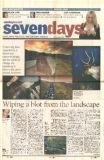
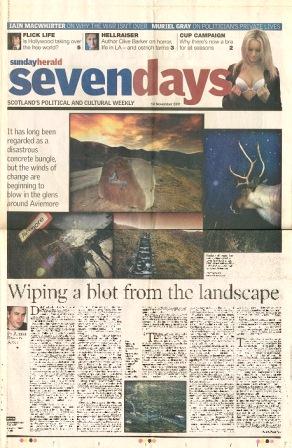
Sunday Herald, Scotland, 18 November 2001
"HarperCollins made me realise I was pushing the envelope. I did not
realise quite how strong it was until we were taking it around
Hollywood. People were horrified.
"I write in a fugue state, and very often don't have any perspective on
what I'm writing until it's done, or for several years afterwards. The
experience of writing for me is a waking dream...
"I have a sort of Tourette's Syndrome of the pen. Still, I'm sure that
when Hieronymous Bosch completed an altarpiece and it was put up, most
of the congregation were thinking 'What the fuck is that?' Don't you
think?"
The Dark Fantastic
By Douglas E. Winter, November 2001 (Note: interview conducted in 2000)
"History has taken its toll on me. There were so many smarter ways to
have managed the career that I have. What I had ten years ago was a
literary career. The way I chose, I don't regret at all, but it put
pressures on me; and sometimes it makes me sad, because I don't have as
many books in me as I thought I did. Maybe I'll find a new energy; but
I've done twenty books, including some big ones, and I wanted there to
be two more Imajicas in me - two more big things - and I'm going to
have to struggle for one, I think. It's hard; and it all relates back
to this thing about being fascinated, at an early age, with all these areas, and being the self-made guy, not in a business sense, but self-educated in these areas, unguided, untaught to a great degree. It
has a lot of strengths, but actually a lot of weaknesses, too, because
you do trip over yourself, over and over again - and everything seems
like an adventure.
"You saw how this grew. Almost everything has been an accident. Not
driven by some overweaning vision: I stumbled into all this stuff. This
is the model for the chaos of something growing organically out of a
passion which then will not be unseated. I get so tired that I sit and cry, but then if I don't let it out, it makes me crazy.
"I'm looking at delivering Coldheart Canyon and the Abarat books, and I've turned in the screenplay of American Horror, and I have so many paintings to finish. And I'm as close to out of my depth as I've ever been - not creatively, but in terms of how much energy there is in me, how many hours there are in a day. Everyone comes up here and says, Well, when do you sleep? It used to be a joke, and now I begin to see that it's a legitimate question."
Coldheart, Hot Fiction
By Randy Dotinga, Pages, November / December 2001 (Note: online at www.ireadpages.com)
"The truth of the matter is that there are so many things to love about this place and so many things to despise about it. They're often tied up with one another. There are a huge number of very beautiful people in this town, but the downside is they're likely to be neurotic and self-obsessed and worried about their looks. The physical beauties I meet in my business are shot through with a theme of insecurity. It makes them hard to be friends with."

Horrors, It's Hollywood!
By Michael Rowe, Advocate, 4 December 2001 (published in slightly different form as Hollywood Darkness: Clive Barker On Coldheart Canyon in Other Men's Sons by Michael Rowe, 2007)
"I realized that I had a deep-seated hatred for these [Hollywood]
people. The rage I felt surprised me.
"I don't know if I would have felt the same previous to the experience
of going around Hollywood with Bill Condon and Ian McKellen trying to
get Gods and Monsters set up. That really changed my idea of what this
town was. Bill is an extraordinary talent, and we had Ian and this
wonderful book. I was angered by the hypocrisy of the people who knew
you were gay but wouldn't say it or who would say it but wouldn't
support us. All of these things were factored in. The story [Coldheart
Canyon] started to tell itself."
Hollywood Horrors
By Cynthia Robins, The San Francisco Chronicle, 15 December 2001
"To read [A Midsummer Night's] 'Dream,' you start in the world of no magic, and you set up the rules in
the real world and then leap off into the wild world. The passion I have to write this kind of stuff is to give people a way to
approach feelings. We can be identified as human from a different angle. In 'Dream,' everybody has feelings that are completely
recognizable to each other, but they are introduced with a richness of metaphor.
"What I've tried to do in my books is to hold the reader with some teasing conceit which has that 'We're not in Kansas anymore'
feeling. It is very obvious within the first two or three pages of what I write that it's going to be a mind-expanding experience... where
the things that people are motivated by in these worlds are the same as in our own world - that what they feel is not remote from our
experience."





